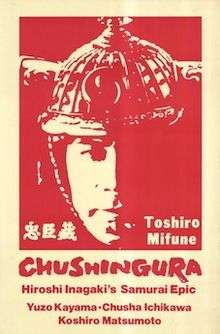Chūshingura: Hana no Maki, Yuki no Maki
| Chūshingura: Hana no Maki, Yuki no Maki | |
|---|---|
 English language move poster, with Toshiro Mifune | |
| Directed by | Hiroshi Inagaki |
| Produced by |
Tomoyuki Tanaka Sanezumi Fujimoto Hiroshi Inagaki |
| Starring | |
| Music by | Akira Ifukube |
| Distributed by | Toho |
Release date |
|
Running time | 207 minutes[1] |
| Country | Japan |
| Language | Japanese |
Chūshingura: Hana no Maki, Yuki no Maki (忠臣蔵 花の巻 雪の巻, Chushingura: Story of Flower, Story of Snow, released as 47 Samurai in the USA and as The 47 Ronin in Australia) is a 1962 color period drama Japanese film directed by Hiroshi Inagaki. The film featured Toshiro Mifune in the role of Genba Tawaraboshi.
Plot
The ruling shōgun Tokugawa Tsunayoshi placed Asano Takumi-no-kami Naganori, the daimyō of Akō, in charge of a reception of envoys from the Imperial Court in Kyoto. He also appointed the protocol official (kōke) Kira Kōzuke-no-suke Yoshinaka to instruct Asano in the ceremonies. Asano is young and idealistic and does not understand various court protocols accepted in mediaeval Japan concerning the back-and-forth payments of officials for larger and lesser favors. Asano only sees these payments as a corrupt form of hand-outs and, worse in his idealistic perspective, as a corruption of government and it just operation. Asano decides to boycott the payment of any 'tithes' to anyone for any reason. Kira is instructed to take notice of this and decides to teach the young Asano a lesson in manners and customs by withholding commonly expected courtesies to rebuke him. Kira is hoping that Asano will become part of the 'tithing' expectations of government officials in the Tokugawa realm.
These 'tithing' expectations weigh heavily on the young Asano, and the intentional withdrawal of common courtesies from him by court officials make him emotionally agitated and unstable. On the day of the reception, at Edo Castle, Asano draws his short sword and attempts to kill Kira. His reasoning appears to lack all decorum of court, but many purport that an insult may have provoked him. For this act, he is sentenced to commit seppuku, but Kira does not receive any punishment. The shogunate confiscates Asano's lands (the Akō Domain) and dismisses all the samurai who had served him, making them rōnin. When their lord is forced to commit ritual suicide, forty-seven of his samurai await the chance to avenge their master and reclaim their honor.
Cast
- Matsumoto Hakuō I as Chamberlain Ōishi Kuranosuke
- Yūzō Kayama as Lord Asano Naganori
- Tatsuya Mihashi as Horibe Yasubei
- Akira Takarada as Takada Gunbee
- Yosuke Natsuki as Okano Kin'emon
- Makoto Satō as Fuwa Kazuemon
- Tadao Takashima as Jûjirô Hazama
- Toshiro Mifune as Genba Tawaraboshi
- Chūsha Ichikawa as Lord Kira Yoshinaka
- Akira Kubo as Lord Date
- Takashi Shimura as Hyôbu Chisaka
- Daisuke Katō as Kichiemon Terasaka
- Keiju Kobayashi as Awajinokami Wakisaka
- Ryō Ikebe as Chikara Tsuchiya
- Setsuko Hara as Riku
- Yoko Tsukasa as Yôzen'in
- Reiko Dan as Okaru
- Yuriko Hoshi as Otsuya
See also
- Forty-seven Ronin
- The 47 Ronin - 1941 film by Kenji Mizoguchi
- The Loyal 47 Ronin - 1958 film by Kunio Watanabe, Daiei star-studded cast
- Akō Rōshi - 1961 film by Sadatsugu Matsuda, Toei star-studded cast
- Nagadosu Chūshingura, 1962 action film
- Daichūshingura - 1971 television dramatization
- The Fall of Ako Castle (aka Swords Of Vengeance) - 1978 film by Kinji Fukasaku
- Matsu no Ōrōka
- List of historical drama films of Asia
References
- 1 2 (in Japanese) http://www.jmdb.ne.jp/1962/cl003560.htm accessed 18 January 2009